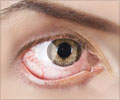High caffeine consumption on daily basis may increase the three-fold risk of glaucoma for those with a genetic predisposition to higher eye pressure.

‘High caffeine consumption on daily basis may increase the three-fold risk of glaucoma for those with a genetic predisposition to higher eye pressure. This suggests that patients with a strong family history of glaucoma should cut down on caffeine intake.’





One of the leading causes of blindness in the United States is Glaucoma. Patients typically experience few or no symptoms at the initial stages, ultimately resulting in vision loss over the period. Although several factors contribute to glaucoma, the elevated intraocular pressure (IOP – pressure inside the eye) is an integral risk factor for it. The present study is the first to demonstrate a dietary - genetic interaction in glaucoma.
"We previously published work suggesting that high caffeine intake increased the risk of the high-tension open angle glaucoma among people with a family history of disease. In this study we show that an adverse relation between high caffeine intake and glaucoma was evident only among those with the highest genetic risk score for elevated eye pressure," says lead/corresponding author Louis R. Pasquale, MD, FARVO, Deputy Chair for Ophthalmology Research for the Mount Sinai Health System.
High caffeine and Glaucoma
The study team utilized the UK Biobank, a large-scale population-based biomedical database supported by various health and governmental agencies, to analyze the records of more than 120,000 participants (of age 39 to 73 years) between 2006 and 2010.
Advertisement
After three years of the study, they had their IOP and eye measurements checked. It was found that overall high caffeine intake was not associated with increased risk for higher IOP or glaucoma.
Advertisement
Moreover, consumption of 321 milligrams of daily caffeine that is, roughly three cups of coffee had a 3.9-fold higher glaucoma prevalence when compared to those who drink no or minimal caffeine and in the lowest genetic risk score group.
"Glaucoma patients often ask if they can help to protect their sight through lifestyle changes, however this has been a relatively understudied area until now. This study suggested that those with the highest genetic risk for glaucoma may benefit from moderating their caffeine intake. It should be noted that the link between caffeine and glaucoma risk was only seen with a large amount of caffeine and in those with the highest genetic risk. The UK Biobank study is helping us to learn more than ever before about how our genes affect our glaucoma risk and the role that our behaviors and environment could play. We look forward to continuing to expand our knowledge in this area," says co-author Anthony Khawaja, MD, Ph.D., Associate Professor of Ophthalmology University College London (UCL) Institute of Ophthalmology and ophthalmic surgeon at Moorfields Eye Hospital.
Source-Medindia















